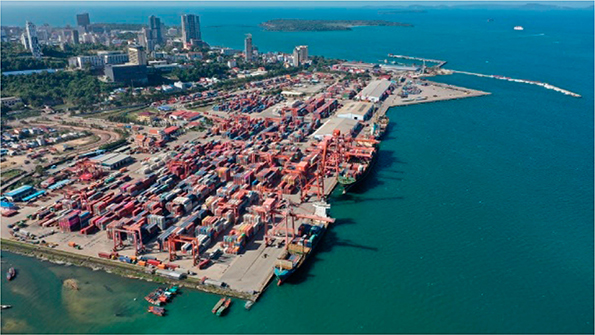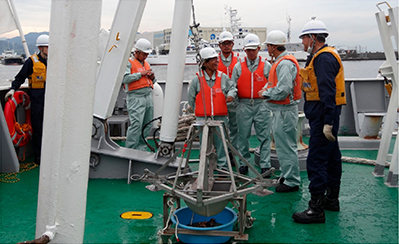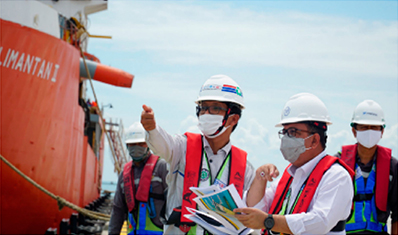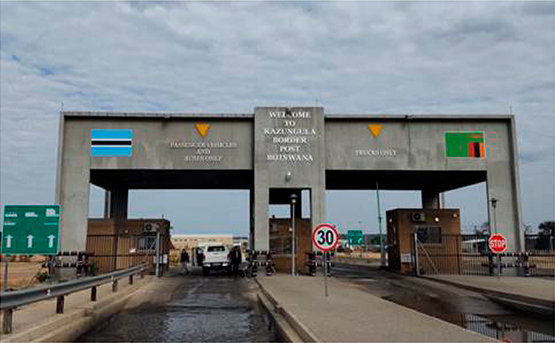ODA Topics 2
Promoting Efforts toward the Realization of “Free and Open Indo-Pacific (FOIP)”

Sihanoukville Port, Cambodia (Photo: JICA)

JICA Knowledge Co-Creation Program (KCCP), “Hydrography for Charting and Disaster Management” course

Teamwork between Japanese and Indonesian engineers in the Patimban Port Development Project, Indonesia, which is undergoing construction through Japanese loan aid

Supporting the development of One Stop Border Posts (OSBP) at the border between Zambia and Botswana through the rebuilding of border facilities and the integration of customs, immigration control, quarantine, and other related operations between the two countries, with a view to enhancing connectivity in the southeastern part of Africa. The photograph shows the entry gate to the OSBP facility on the Botswana side. (Photo: JICA)
The Indo-Pacific region, which extends from the Asia-Pacific Ocean through the Indian Ocean to the Middle East and Africa, is the core of vitality for the world and home to half of the world’s population. To establish a free and open order based on the rule of law with the countries and regions of the Indo-Pacific with various partners in the international community that share these ideals, Japan promotes efforts to realize the “Free and Open Indo-Pacific (FOIP)” that Japan advocated in 2016. Japan has already confirmed cooperation on these efforts with not only the United States but also Australia, India, Canada, the Republic of Korea, the Association of Southeast Asian Nations (ASEAN), and major European countries. In May 2022, Prime Minister Kishida hosted the Quad Leaders’ Meeting, where the leaders affirmed their continued and strong commitment toward the realization of FOIP, and concurred on further deepening collaboration and cooperation with the respective countries and regions. During the Shangri-La Dialogue held in June, Prime Minister Kishida announced to lay out a new plan to strengthen FOIP cooperation by the following spring. Amid Russia’s ongoing aggression against Ukraine, which has shaken the very foundations of the international order, FOIP is becoming even more important.
Japan’s ODA is one of the important tools for the realization of FOIP. For example, Japan aims to promote economic prosperity by enhancing connectivity across the region. It intends to achieve the growth of the entire region by developing ports, airports, roads, railways, and other infrastructure within the area and connecting cities and hubs with one another in line with international standards.
One example is assistance for Sihanoukville Port in Cambodia. Sihanoukville Port, which handles approximately 70% of Cambodia’s container cargo imports and exports, supports the overall economic development of Cambodia. However, its container cargo handling capacity is becoming strained as a consequence of the country’s strong economic growth. Japan provides assistance to construct a new container terminal. Japan also signed a Japanese yen loan agreement in August 2022 for a project to expand the same container terminal, thereby contributing to improving the port’s container cargo handling capacity as well as enabling large vessels to dock directly at the port. Japan also provides support to improve the efficiency of the port operations through the dispatch of JICA experts and the implementation of technical cooperation projects so that the port can operate as a hub of principal ports in the region. The development of the port, which is geopolitically important as it is located at the node between the Pacific and Indian Oceans, is expected to boost the realization of FOIP.
In September 2022, Japan decided to provide assistance to Yemen in cooperation with the United Nations Development Programme (UNDP) through the grant aid project “the Project for the Improvement of Efficiency in the Port of Aden.” This project also supports the enhancement of the region’s connectivity through strengthening the functions of the Port of Aden located near the Bab al-Mandab Strait that serves as the doorway to the Red Sea. As the conflict in Yemen has made it difficult to access some ports in the country, the number of cargo ships entering the Port of Aden is rising every year, making it a vital marine facility for commercial activities and humanitarian aid activities in the country. This project is expected to speed up cargo handling and reduce cargo transportation costs by providing equipment for the renovation of cargo sheds and digitalization of container management at the Port of Aden.
Facilitating smooth logistics processes by securing connectivity also contributes to supporting Japanese companies’ exports to the region and overseas expansions. Japan supports the development of quality infrastructure toward the realization of connectivity across the Indian and Pacific Oceans. Japanese technology transfers and human resources development are effective in supporting developing countries to build quality infrastructure and will enhance the competitiveness of Japanese companies in ODA tendering, as well as strengthen trust in Japan.
Japan also contributes to securing maritime peace and safety. For example, in the Straits of Malacca and Singapore, a logistics hub navigated by approximately 16,800 Japan-related vessels every year, Japan utilizes ODA to support capacity building for anti-piracy measures in coastal countries, thereby reducing the number of piracy incidents. Similarly, in the Indian Ocean, Japan contributes to ensuring marine traffic safety by providing capacity building support to coast guard agencies for maritime rescue, technical cooperation for nautical chart preparation, and support toward Vessel Traffic Service (VTS).
Furthermore, Japan strengthens the promotion and consolidation of the rule of law in developing countries by providing assistance for the development of legal systems and judicial reforms. Through such efforts, Japan contributes to establishing good governance in developing countries, creating a foundation that is crucial to the realization of sustainable growth, and fostering an effective trade and investment environment for Japanese companies’ overseas expansions.
Japan is an island country and a leading importer ranked fourth in the world. Its industries and the lives of its people are heavily reliant on maritime transportation and cargo. From this perspective, securing connectivity and ensuring the safety of sea lanes are important for Japan’s economy, energy, and food security. The stability and prosperity of Japan and this region cannot be realized without a “Free and Open Indo-Pacific” where various people, goods, and wisdom are actively exchanged, supported by highly transparent rules. Japan will make efforts to realize FOIP by utilizing various forms of assistance, including ODA.
